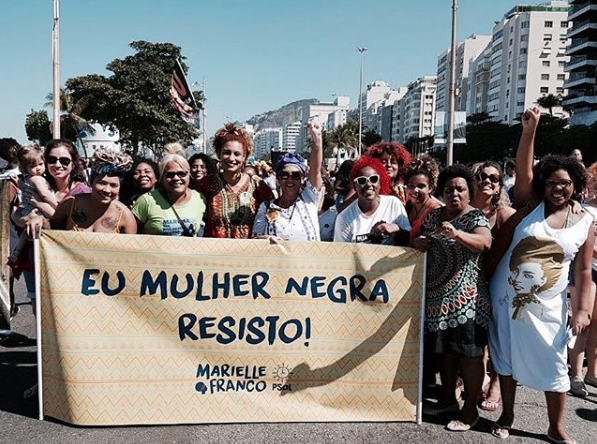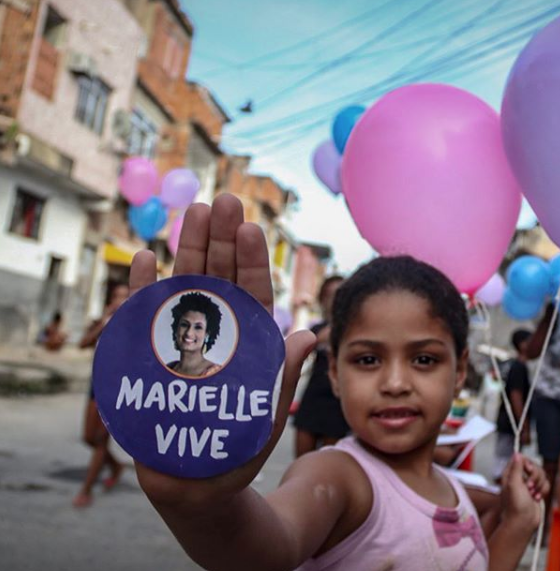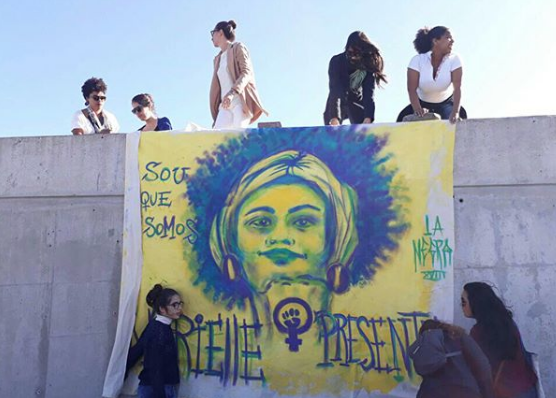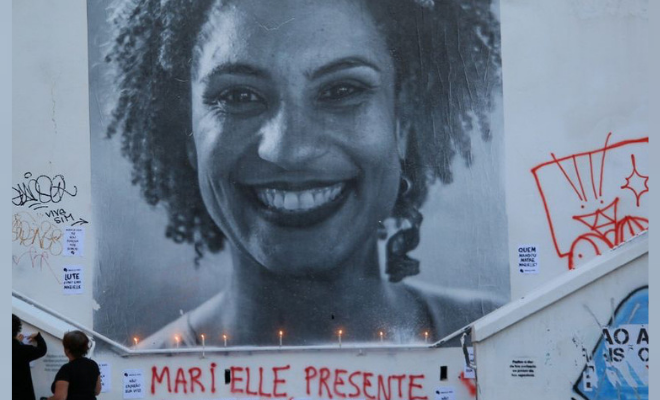Marielle Presente: the Woman that Changed the Feminist Movement in Brazil
“Mulher
MORE: Cardi B Gets Political & We’re So Here For It
Franco’s position in the city council of Rio de Janeiro itself was revolutionary. The Brazilian activist was one of the seven women serving among fifty-one chairs. She advocated for women’s rights for abortion, feminine representation in politics, and Brazil’s Day of Lesbian Visibility. During her time in office, Franco proposed to increase the numbers of
On the day she was assassinated, the late politician organized a debate for black young women alongside her socialist and libertarian followers. During the outing, she discussed important topics such as racism, identity, and a new age of activism.

“The mandate of a black woman,
Last year on the evening of March 14th, following the debate, Franco and her driver Anderson Pedro Gomes were fatally shot. Three-hundred days later, and Monica Benicio, Franco’s partner, party, and followers still
WHAT WE KNOW THUS FAR:
On Tuesday, the newspaper O Globo reported five suspects were arrested, though it is still unclear their involvement in the late
Adriano Magalhães da Nóbrega is another suspect but, has not been found. According to the Latin publication, He is associated with Flávio Bolsonaro.
Pereira and Nóbrega are thought to be part of Escritório do Crime, a group supposedly involved in the killing of Marielle Franco. Though Flávio Bolsonaro is associated with both men, the police
“If the connection between Flávio Bolsonaro and the militia who killed Marielle, this will no longer be a money laundering scandal, but the direct involvement of the family of the President with organized crime,” tweeted Guilherme Boulos. A colleague of Franco, Boulos’ comment was released last year during his election following her death.
History professor, Marcelo Freixo and State R
“The militias need to be addressed, not honored.” Freixo wrote on Instagram “The Bolsonaro family owes explanations.”
City Council Member, Marcello Siciliano has been a suspect for ordering the hit since May 2018. He is said to be associated with a militia leader Orlando Curicica, who allegedly asked to kill Franco. The Brazilian revoluationist was an outspoken critic of police brutality, violence in the favelas, and the military intervention in the state of Rio. She was supposed to lead a commission that would act as a check on the military intervention. While Siciliano has repeatedly denied the accusations, last week, on January 16, the militia leader’s driver was arrested and told the investigators that he drove Curicica to meet Siciliano, who has said before that he didn’t even know Curicica.
FRANCO’S LEGACY IN BRAZIL
In a country with the highest number of human rights defenders murdered, in which the current president states, “human rights only defend criminals,” Franco’s dedication to protecting women’s rights, fighting against racism and homophobia was a sign of resilience. The brutality of her murder momentarily lowered the morality of those that felt represented by Franco.
“The physical disappearance of

However, her loved ones and followers channeled their pain
“Marielle had an urgency to live and fighting was in her heartbeat and that has reached not only in Brazil but the entire world,” said Benicio. During a meeting for the city council soon after Franco’s death, her former partner coined the phrase, “Her voice will not be silenced.”
Franco’s work still lives on today. After her death, five of the Brazilian politician’s projects were approved in the city council. In her thirteenth month in office, Franco introduced thirteen laws. They benefitted Black women, LGBTQ communities, and the youth of Rio de Janeiro. She proposed the institution of Espaço
But more importantly, Marielle still lives in Monica’s continuous fight for justice and as the new face of the feminist movement, in which, as her partner said on The Guardian, “affection and solidarity is [the] answer. Violence can’t be fought with violence.”
“Marielle had an urgency to live and fighting was in her heartbeat and that has reached not only in Brazil but the entire world.” Monica said.
FRANCO’S LEGACY AROUND THE WORLD

The injustice attracted international attention unlike before. Solidarity marches for Franco took the streets of the biggest cities in Brazil and the world – Paris, London, Lisbon, Berlin, Geneva, Buenos Aires, Santiago, Lima, New York, Washington, and Montreal. The countries and nations of Catalan, Ecuador, Kurdistan, Pakistan, and Honduras also sent messages calling for justice to Marielle’s family and party. In the city of Cologne, Germany, there is now a street honoring the councilwoman and explaining her execution.
Amnesty International has repeatedly condemned the Brazilian government for not taking the necessary measures to investigate the case. On the 10-month mark of Franco’s death, representatives of the organization met with the family of Franco to pressure Wilson Witzel, the state governor, into providing answers. Even celebrities mourned the
Just read about this courageous woman #MarielleFranco, who fought for the rights of the poor in the Favelas. I’m standing and fighting with you Brazil ??!!
— Viola Davis (@violadavis) March 20, 2018
Viva Marielle and Anderson!!!https://t.co/nMTwBrUZrW
The assassination of human rights activist #MarielleFranco was a huge loss for Brazil — and the world @ShaunKing https://t.co/POeQR2bsgG pic.twitter.com/Ocrw1WwYoB
— RuPaul (@RuPaul) March 19, 2018
A strong woman of color fighting for justice is the most targeted human in these systems of power. She was a brilliant activist with so much love and light in her heart, and she was murdered. I pray her soul rests in light and helps us still on earth with completing the mission. https://t.co/5fNbMglGnC
— Lauren Jauregui (@LaurenJauregui) March 16, 2018
WHAT YOU CAN DO
Though Franco’s party and loved ones were taking her issues to the streets, their main form of activism is through social media. Monica extensively posted the days it has been since Franco’s death, always with the same question: who killed Marielle? Who killed Marielle and Anderson? Who ordered the hit? And she encouraged everybody to do the same.
“How can people support this cause? There are various things they can do.” Monica said to Amnesty International. “They can sign the petition on Amnesty International’s website, be active on social networks and ask for justice. This will put pressure on the Brazilian government. It is important that the government takes action not with any solution aimed at closing the case, but with the right response.”
Amnesty International has platforms to demand justice for Marielle Franco. “What happened to Marielle was terrible.” Monica continued. “Not just because I lost the person I loved, but in terms of Brazilian democracy. Brazil owes the world a satisfactory response today.”



Comments.
Caroline
Clara, your writing is amazing and your article is so empowering. You probably worked so hard to find all these informations and really contribuited to help everyone to understand the gravity of what is happening. As a future journalist this is rare and so important. Brazil and USA vehicles should be proud and give more plataforms for you to speak and I really see your bright and value as a writer. You definetely are making difference. Congrats.